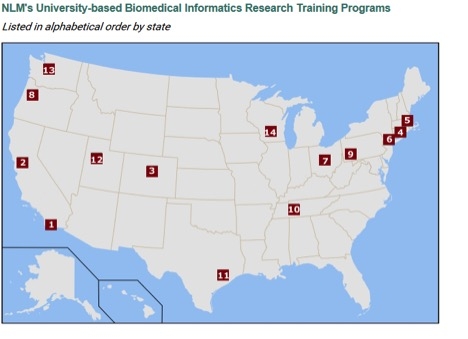The National Library of Medicine: A Leader in Biomedical Informatics and Data Science Research
April 2017
Prepared by the Joint MLA/AAHSL Joint Legislative Task Force
For further information, contact Mary M. Langman at 312.419.9094 x27
Click here for PDF version
The National Library of Medicine (NLM) is the leading government supporter of research in biomedical informatics – the field applying computer and information technology to biomedical research, medicine, and public health. This research promotes discovery that can lead to better patient care, innovation, and education, all of which support improved health outcomes for our nation’s citizens. In addition to research conducted in its two intramural labs, the Lister Hill National Center for Biomedical Communications and the National Center for Biotechnology Information, NLM’s extramural grants program supports research in universities, medical centers, small businesses, and community organizations to drive advances in electronic health records, clinical decision support, information retrieval, advanced imaging, computational biology, telecommunications, and other areas.
Informatics and Data Science Research: 85 active grants valued at $32.8 million
NLM
- Funds grants for basic and applied research in the sciences of organizing, storing, managing, analyzing, and representing biomedical data, information & knowledge
- Supports research that applies concepts from computer, information, and engineering, and data sciences to problems in medicine, public health, and biological/behavioral sciences
- Has funded research of six recent recipients of Presidential Early Career Awards for Scientists and Engineers
Training Biomedical Informatics Leaders: 200 trainees in 14 university-based training programs
For more than 40 years, NLM has been the principal source of federal government support for research training in biomedical informatics. These programs:
- Provide pre-doctoral and post-doctoral training in biomedical informatics and data science
- Enhance diversity in the field through special recruitment efforts in target populations
- Also make available individual fellowships for pre-doctoral students attending other universities
Resources to Support Information Seeking and Research Data Management
NLM offers resource grants that are unique within NIH. They include:
- Information Resources to Reduce Health Disparities for projects that develop/offer health information resources tailored for special and underserved populations
- Informationist Services grant supplements to NIH biomedical researchers to bring an information specialist onto the research team to help them prepare data for broader access and sharing
- Open Educational Resources in Big Data Management that health sciences librarians can use to teach others in their community the basics of managing biomedical research data sets (part of the NIH Big Data to Knowledge (BD2K) initiative)

1. University of California San Diego; 2. Stanford University; 3. University of Colorado Anschutz Medical Campus; 4. Yale University; 5. Harvard University (Medical School; 6. Columbia University Medical Center; 7. Ohio State University; 8. Oregon Health & Science University; 9. University of Pittsburgh; 10. Vanderbilt University; 11. Rice University; 12. University of Utah; 13. University of Washington; 14. University of Wisconsin Madison.
The Medical Library Association (MLA) is a nonprofit, educational organization with 3,500 health sciences information professional members worldwide. Founded in 1898, MLA provides lifelong educational opportunities, supports a knowledgebase of health information research, and works with a global network of partners to promote the importance of quality information for improved health to the health care community and the public.
The Association of Academic Health Sciences Libraries (AAHSL) supports academic health sciences libraries and directors in advancing the patient care, research, education, and community service missions of academic health centers through visionary executive leadership and expertise in health information, scholarly communication, and knowledge management.

